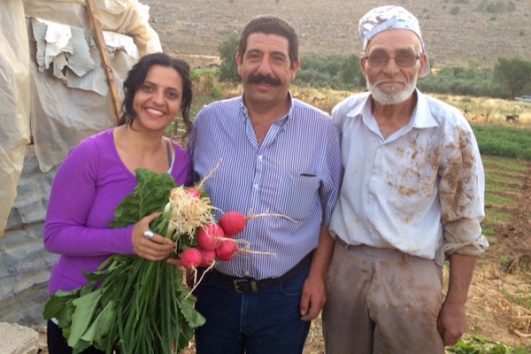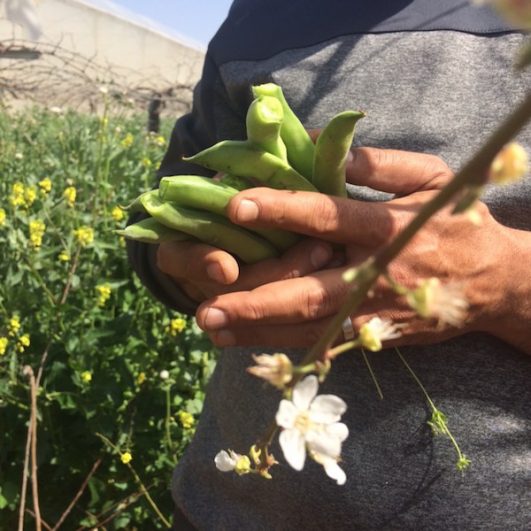Vivien Sansour, founder of the Palestine Heirloom Seed Library, talks to +972 Magazine about Palestinian agricultural heritage, the occupation in global context, and the movement to preserve local farming techniques and biodiversity.

“I speak about the occupation within a global context because it does not exist in isolation from global trends,” Vivien Sansour tells me. “Farmers who can produce their own food and make their own seeds represent a threat to any hegemonic power that wants to control a population. If we are autonomous, we really have a lot more space to revel, to create our own systems, to be more subversive.”
Vivien Sansour wears many hats. She is a writer, a photographer, a film producer, and the founder of the Palestine Heirloom Seed Library. Raised in Beit Jala, a town near Bethlehem in the occupied West Bank, Sansour has worked with farmers in Honduras, Uruguay, and Palestine on issues relating to agriculture and autonomy.
With the Palestine Heirloom Seed Library, her latest project, Sansour hopes not only to preserve Palestinian agriculture heritage — “the rituals, practices, methods, that we’ve used over centuries, that we’ve inherited from our ancestors,” she explains — but to revive varieties of seeds once native to Palestine, which are no longer widely grown.
Sansour and I spoke Wednesday about the occupation’s impact on Palestinian agricultural practices and the global movement to preserve local agricultural heritage and biodiversity. “I’m not inspired by great world leaders,” Sansour says. “I’m really inspired by farmers who keep planting, cultivating, and feeding the world. There are so many forces working against them, yet they continue to be generous in spirit.”
The following interview has been edited for length.
How did you get interested in the study of agriculture?
I grew in Beit Jala, which today is just a mound of very unattractive cement buildings, but which used to be full of terraces that were full of biodiversity and different natural habitats.
At some point in my adult life, I realized more and more old olive trees were being uprooted to build another building. I felt like I wanted to do something. What I do today probably sprouted from an instinct to survive: trying to participate in a global movement to save our agricultural heritage and biodiversity.
What is agricultural heritage?
It is the rituals, practices, methods that we have used over centuries, which we inherited from and our ancestors.
Farmers are scientists and artists at the same time. In order for them to develop what we eat, they have to ask questions and make observations. They also have to imagine new possibilities and try them out, which is what artists do. A lot of imagination had to have taken place for our grandparents to develop seeds. It required a lot patience, attention, and imagination to say, “I want to try this to see if it works better.”
This combination of the artist/scientist creates a culture where the things that they developed over millennia became part of our everyday living, our everyday practice. That is our heritage: what our ancestors developed for us to survive. And not just survive, but to enjoy — that’s something that seems to be missing a lot these days when we talk about food.
You founded the Palestine Heirloom Seed Library to preserve Palestinian agricultural heritage. What is the seed library? What makes an heirloom seed different from other kinds of seeds?
An heirloom is something that is passed down to you. We refer to heirloom seeds as such because they have been passed down to us through previous generations, and have specific characteristics we like. For example, there’s a certain kind of zucchini that has been developed because we make stuffed zucchini with grape leaves. That kind of variety was developed through natural selection and breeding by our ancestors.
An heirloom seed is also acclimated to one’s microclimate, which allows it to be resistant to many diseases. In Palestine, a lot of our heirlooms seeds are what we call ba’al seeds. Ba’al refers to the Canaanite deity of fertility and destruction. We use the term ba’al today to mean seeds that don’t require irrigation. If they are winter ba’al, they live off of the rain. If they are summer ba’al, they live off both the moisture that is retained in the soil from the rainy season, as well as dew.
The Heirloom Seed Library is a library, except that you check out seeds instead of books. You can come to the library, take some seeds, and make a commitment to plant them, watch them grow, and see them through the full cycle in order to then make your own seeds. A lot of people want to start a garden and produce their own food, so they take seeds and in the process learn about food autonomy. They can choose from among the things they grow — the strands they like best, or ones that work better for their microclimate, and thus develop their own heirlooms.

What has been the impact of the occupation on Palestinian agriculture and traditional Palestinian cuisine?
I speak about the occupation within a global context because it does not exist in isolation from global trends. For example, our farmers who can produce their own food and make their own seeds, represent a threat to any hegemonic power that wants to control a population. If we are autonomous, we really have a lot more space to rebel, to create our own systems, to be more subversive.
The occupation has, just like many powers in the world — including the Mexican government, for example in Chiapas — played a very big role in transforming Palestinian agriculture from being an autonomous system based on soil and sun to one that is very much based on chemical imports and hybrid seeds, which overflow the market. The occupation has convinced a lot of people that we really need hybrid seeds, agricultural technologies, to “modernize” our farming practices, to “develop.”
Beyond that, the occupation has transformed the farmer from a productive entity, from a productive human being, into a worker. They are like machines that simply buy the pre-packed hybrid seeds and the necessary chemicals. If you are no longer an autonomous body, you no longer have the mental liberation to allow yourself to create your own life. You stop imagining, you stop believing that you actually have anything to contribute. You start to just follow the rules, and that’s what conventional farming is: following the rules, filling in the blanks.
That’s the greatest disaster, because the imagination and knowledge of our farmers is being seriously threatened. Many of the geniuses and heroes we live with are either dying off or are no longer active members in the community at a time when we need their knowledge more than ever before.
What inspires you? What gives you hope?
I’m not inspired by great world leaders. I’m really inspired by farmers who keep planting, cultivating, and feeding the world. There are so many forces working against them, yet they continue to be so generous in spirit. I think that that generosity of spirit inspires me to want to do better as an individual who has a role in society.
The Seed Library wants to bring old varieties of farming back to the dinner table, whether it’s the watermelon, wheat, or a cucumber. As part of this effort, we have built a traveling kitchen that will go to different communities where we will cook together and and invite people join us for a conversation about the importance biodiversity, our heirloom varieties, and our agricultural heritage. We will begin in the village of Nufs Jubeil in the Nablus area on March 17, and if people want to join us, they’re welcome to.

